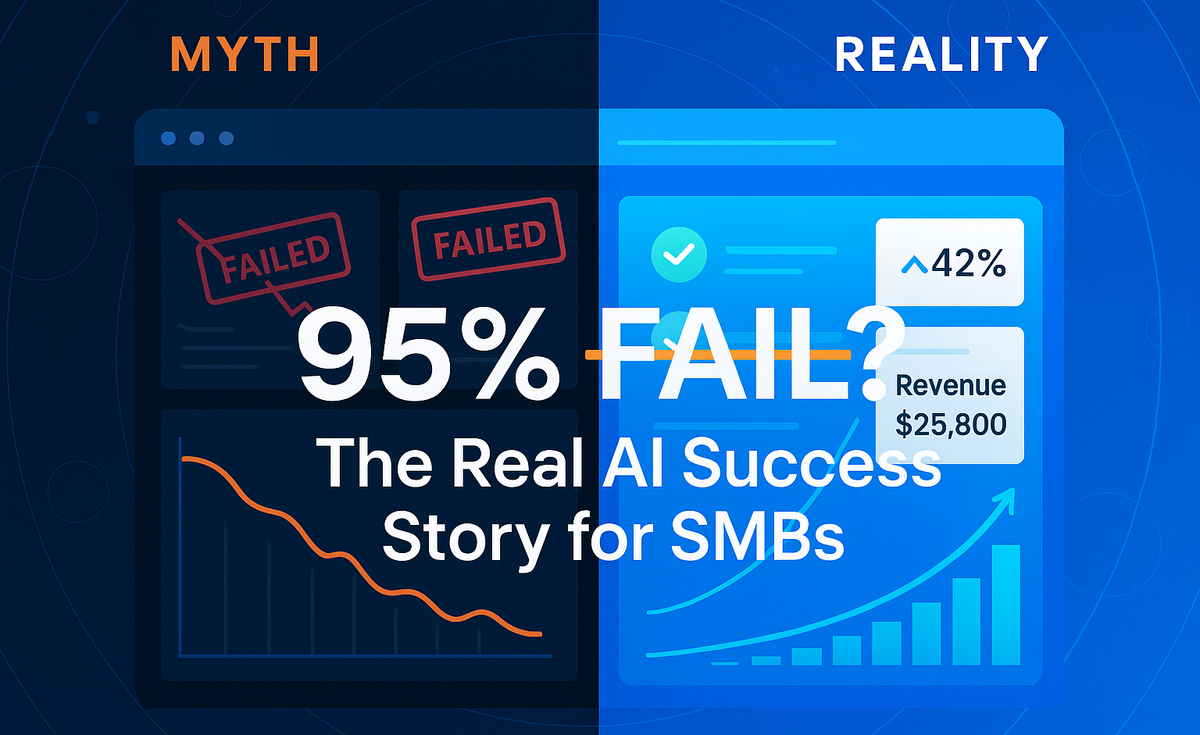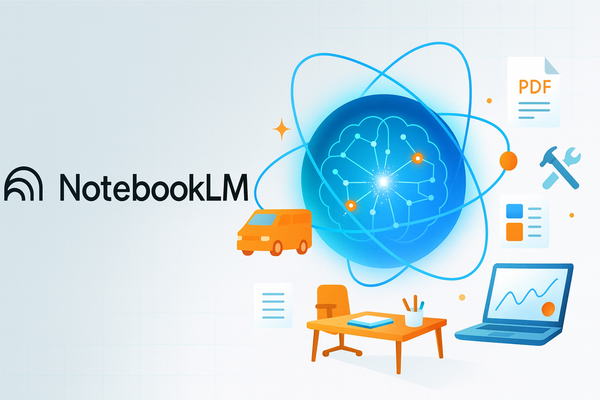That Viral "95% AI Failure" Stat Is BS — Here's What Small Businesses Actually Need to Know

Let me guess: someone in your network just shared that scary MIT report claiming 95% of AI projects fail.
Maybe it was your business coach. Maybe it showed up in your LinkedIn feed three times this week. Maybe your Finance leader forwarded it with the subject line "See? I told you so."
And now you're wondering if you should just shelve that AI voice agent idea, forget about automating your scheduling, and stick with what you know.
I get it. You're busy running an actual business. The last thing you need is another expensive tech experiment that goes nowhere. You've got payroll to meet, customers to serve, and a to-do list that's already three miles long.
But here's what nobody's telling you about that viral report — and more importantly, what's actually happening with AI in small businesses like yours.
The MIT Report Everyone's Freaking Out About? It's Flawed
Look, I'm not here to throw shade at MIT. But when a single statistic starts making smart business owners freeze up on decisions that could transform their operations, we need to talk about what's really going on.
That 95% failure rate? It came from 52 interviews. Not 5,200. Not 520. Fifty-two.
That's like judging every restaurant in America based on 52 Yelp reviews.
Here are the three problems nobody's mentioning:
1. Sample Size So Small It's Meaningless
The report interviewed 52 organizations and admitted the findings were "directionally accurate based on individual interviews rather than official company reporting." Translation: They didn't even verify the data against actual financial records. They just asked people how they felt about their AI projects.
2. "Success" Was Defined So Narrowly That Wins Got Labeled Failures
According to this report, if your AI project didn't hit every single KPI six months after launch with direct P&L impact, it was a failure.
That's like saying your marketing campaign failed because you didn't 10x revenue in Q1.
What about the HVAC company that cut response times from 4 hours to 30 minutes? Failure.
What about the consulting firm that freed up 15 hours a week of admin work? Failure.
What about the retailer that reduced customer churn by 20%? Also a failure.
Because none of those showed "direct P&L impact measured six months post pilot."
3. Even a Wharton Professor Couldn't Figure Out Where the 95% Came From
Kevin Werbach from Wharton's School of Business read the report multiple times and said he "still can't understand where it comes from." The charts are confusing, unlabeled, and the methodology is nowhere to be found.
The report itself even admits that "unsuccessful" doesn't mean "zero returns" — but that didn't stop the headlines.
Here's What's Actually Happening with AI in Small Business
Ready for some real data? Not from 52 interviews, but from comprehensive surveys of thousands of actual small and medium businesses?
The numbers tell a completely different story:
- 91% of SMBs using AI report revenue growth (Salesforce.com, 3,350 businesses surveyed)
- 86% see improved profit margins
- Average ROI: 250-400% within six months
- $3.50 returned for every dollar invested
- Customer service response times drop by 68%
- Annual savings average $7,500 (25% of SMBs save over $20,000)
Gartner found that 54% of AI projects successfully transition from pilot to production — more than ten times the "success rate" MIT claimed. And 72% of organizations have adopted AI overall.
For small businesses specifically? The U.S. Small Business & Entrepreneurship Council calculated that AI tools save small businesses a collective $273.5 billion annually. That's with a B.
Why Some AI Projects Actually Do Fail (And How to Avoid It)
Here's the thing — AI projects do fail sometimes. But not because AI doesn't work.
The RAND Corporation studied 65 data scientists and engineers with over five years of experience and found five root causes of AI project failure:
- Leadership doesn't understand what they're actually trying to solve
- Tech infrastructure isn't ready (your data is a mess)
- Data quality problems (garbage in, garbage out)
- Nobody in the organization understands AI well enough to implement it properly
- Confusing temporary problems with permanent ones (giving up too soon)
Notice what's missing? Not one of these is "AI technology doesn't work."
Every single failure point is about organizational readiness and strategy. Which means they're all fixable.
What Successful SMBs Are Doing Differently
The 25% of small businesses that have already integrated AI into daily operations aren't lucky. They're not tech geniuses. They don't have massive budgets.
Here's what they did:
✅ Started small and focused — one high-impact use case, not a complete digital transformation
✅ Chose proven solutions over building custom systems from scratch
✅ Made sure their data was clean before trying to automate anything
✅ Trained their teams and actually listened to employee feedback
✅ Measured clear KPIs — time saved, leads captured, costs reduced
✅ Gave it realistic timelines — 90 days to show value, not 6 months
The businesses seeing 20%+ productivity gains typically started with customer service or marketing automation. They demonstrated value first, then scaled. They didn't try to boil the ocean.
The Path Forward: Growth, Automated
Look, I'm not here to convince you that every AI project succeeds. That would be just as misleading as the 95% failure stat.
What I am saying is this: Don't let one flawed report keep you from exploring tools that could genuinely transform your business.
SMBs actually have advantages over enterprises when it comes to AI:
- You can move fast without layers of bureaucracy
- You can test something and know within weeks if it's working
- You have integrated systems (or at least fewer disconnected ones)
- You can demonstrate ROI quickly without navigating committee approvals
The question isn't "Will AI work?" The question is "What's the first problem worth solving?"
Is it:
- Missed calls turning into lost revenue?
- Manual scheduling eating up hours every week?
- Customer questions that your team answers 50 times a day?
- Quoting processes that take too long and cost you deals?
- Onboarding new team members who keep asking the same questions?
Pick one. Start there. Measure the outcome. Scale what works.
That's not hype. That's not complexity. That's growth, automated.
At the end of the day, success isn't measured by what some report says. It's measured by whether your business is growing, your team is more productive, and you're finally getting home in time for dinner.
What's your take? Have you tried AI in your business? Seen it work? Seen it flop? Drop a comment — I'd genuinely love to hear what's working (or not working) in the real world.
About Outcome Orbit AI: We help small and mid-sized businesses turn AI complexity into clear, measurable growth. If it doesn't deliver value, we don't recommend it. Learn more at outcomeorbit.ai





